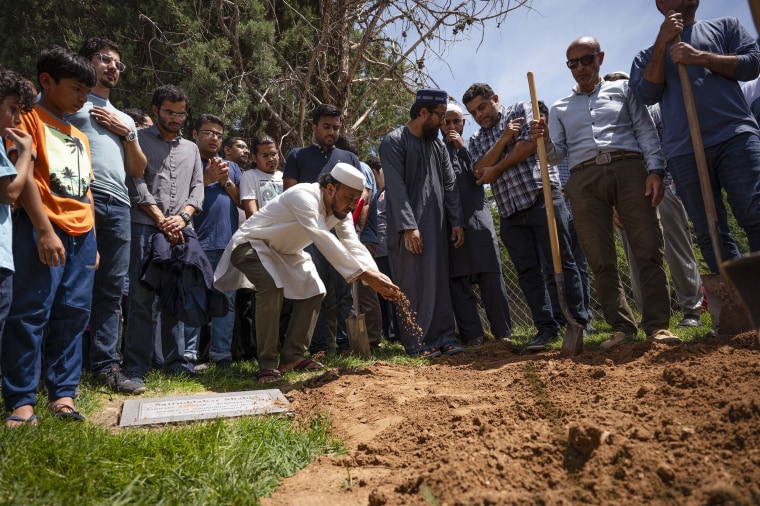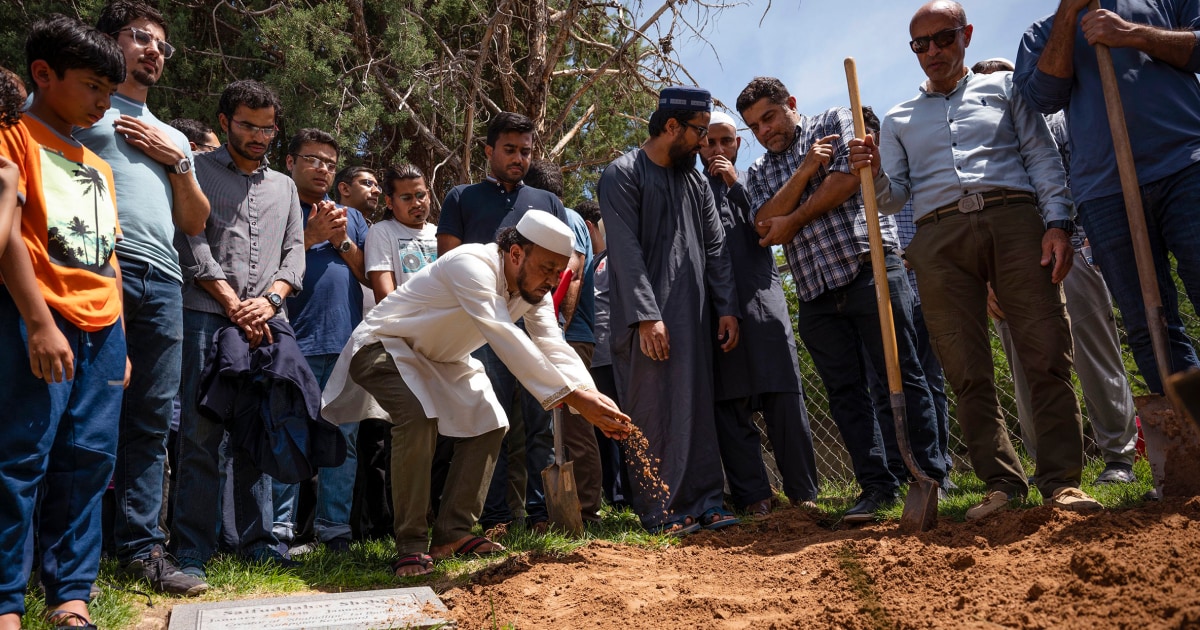ALBUQUERQUE, NM — Sharief Hadi, a halal market and cafe owner, left Afghanistan in the 1980s and settled in the United States for what he thought would be a safer life.
But after the murders of four Muslim men in the city in the last few months — including his brother Mohammad Zaher Ahmadi — Hadi’s faith in the American dream is shattered.
“I thought I was living a dream, but it’s no dream. It’s the opposite,” Hadi, 73, said in a phone interview Monday. “They took my brother’s lovely life. I don’t care about my life anymore.”
The spate of murders across the Albuquerque area has stunned the city and shaken the small, close-knit Muslim community, fueling fears of a racist serial killer on the loose.
Albuquerque law enforcement officials believe the killings of 62-year-old Ahmadi, 41-year-old Aftab Hussein, 27-year-old Muhammad Afzaal Hussain and 25-year-old Naeem Hussain might be linked.

Authorities said Sunday they identified a “vehicle of interest” connected to all four slayings, and the FBI is assisting local officials with the investigation. Police said they have not yet determined a motive.
Ahmad Assed, the president of the Islamic Center of New Mexico, a mosque that all four victims attended, said in an interview Monday that he felt “broken” and “devastated,” as did many in a community he described as “disheartened.”
“They feel a certain helplessness, they’re in fear,” Assed said of Muslim community members. “Their whole world has been flipped upside down.”
He added: “Everybody is very deflated and eagerly awaiting some response as to why?”
Assed said the Islamic Center is the heart of social interactions between community members. In the wake of the killings, many local Muslims have chosen to stay home, where they feel safe and “not take chances to come to the mosque,” he said.
Hadi, the halal market owner, echoed that comment. He said that Muslim people in the area appear to be too frightened to go outside for fear of being senselessly gunned down.
“They don’t want to go to the store. They don’t want to go pray. They don’t want to go to the mosque,” Hadi said, his voice rising in anger. He added that his own business has suffered in recent weeks.
Ahmadi was killed on Nov. 7, according to police. Several months later, three more Muslim men were gunned down. Aftab Hussein, who was born in Pakistan, was killed on July 26. Muhammad Afzaal Hussain was found dead on a sidewalk last Monday. Then, just before midnight Friday, Naeem Hussain was found dead, too.
The Council on American-Islamic Relations, the nation’s largest Muslim civil rights and advocacy organization, said it was offering a $10,000 reward for information that leads to the arrest of whoever is behind the killings.
President Joe Biden decried the murders, saying in a tweet Sunday that his “prayers are with the victims’ families, and my Administration stands strongly with the Muslim community.”
“These hateful attacks have no place in America,” Biden added.
The four men all left behind relatives, friends and colleagues who are struggling to understand the bloodshed.
Naeem Hussain’s body was discovered in the parking lot of Lutheran Family Services Rocky Mountains, a nonprofit that had helped him resettle in Albuquerque. Hussain was born in Pakistan and came to the US as a refugee several years ago seeking better opportunities, according to his brother-in-law, Ehsan Shahalami. He just became a US citizen on July 8.
Shahalami said that during a shopping trip with his wife, children and Hussain last month, Hussain bought a new suit, dress shirt and shoes for his oath of citizenship ceremony.
“He was very excited about that ceremony,” said Shahalami, 37, a Virginia resident. “Because now he was becoming a US citizen. He obviously took pride in that.”
Hussain worked as a truck driver and saved up enough money to buy a truck of his own that he insisted on driving when the pandemic began. “A lot of drivers basically took unemployment because of the Covid situation and when it came to Naeem, he said, ‘You know, the country needs us more than any time right now. So we need to keep driving and try to influence other drivers to keep driving,'” Shahalami said.
“Naeem should be remembered for who he truly was — a genuine, giving man,” Shahalami said. Hussain loved being outdoors, especially camping and fishing, and was known to drive around with fishing rods in his car.
Shahalami said that although it is their wives who are sisters, I considered Hussain a brother and that the two were very close. They spoke regularly and spent the Fourth of July together in Virginia. Hussain had planned to bring his wife from Pakistan to the US after he became a citizen.
“He actually had some good business plans for the future but not knowing of the future obviously,” Shahalami said. “Those plans are no longer.”
Muhammad Afzaal Hussain’s brother, Muhammad Imtiz Hussain, told NBC News that he feels scared for his life, haunted by the knowledge that his brother was gunned down near seemingly normal residential streets — “places my kids go for bike riding.”
The late Hussain was the planning and land use director for the city of Española, roughly 90 miles north of Albuquerque. Vince Baldonado, one of his colleagues, described feeling anxious when Hussain did not show up at the office last Tuesday.
“We were all asking each other, ‘Did you get a call?’ Did you get a text? Is he stuck in traffic?’ We didn’t think the worst… but then we heard.”
Baldonado, 42, eventually learned through another colleague that Hussain had been found dead the night before.
“I couldn’t believe it,” Baldonado said. “I’ve never lost a friend to gun violence. He was my supervisor, my boss, my close friend.”
Baldonado added that he had planned to go fishing and camping with Hussain sometime before the end of the summer. He recalled with affection that Hussain always took an interest in his children, encouraging Baldonado to enroll them in STEM classes.
“He didn’t have a single mean bone in his body,” Baldonado said.
Guad Venegas reported from Albuquerque; Daniel Arkin and Janelle Griffith from New York.
